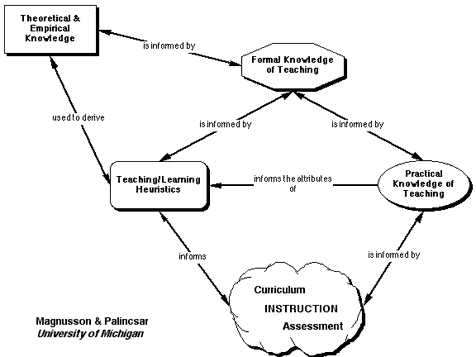

|
About GIsML Instruction |
|
About the GIsML Project > Theoretical Foundations

Constructivism
- attention to incoming sensory stimuli is an active, selective process
- sense-making of stimuli is an active, constructive process drawing upon what is already known
Social Constructivism
-
zone of proximal development & extension to apprenticeship model of instruction
-
activity theory
Contemporary Philosophy of Science
-
the "scientific" description of reality is a product of the human imagination
observation is theory-laden -
development of scientific knowledge does not follow a single "method"
-
theories are products of the human mind and often include unobservable elements
-
theories are refutable but not provable
General principles derived from learning theory that undergird the GIsML orientation The Interaction of Knowledge and Reasoning
-
build new knowledge from existing knowledge
-
domain-specific knowledge guides decision-making in the analysis and interpretation of data
-
instrumentality of knowledge in advancing understanding (e.g., explanations that are powerful)
-
domain-general strategies guide the inductive processes employed in constructing new knowledge (Fodor’s paradox)
The Cultural Basis of Knowledge Production Inquiry is an existing
cultural tool (Wertsch, 1998), not something that has to be invented.
This tool is used generatively in the production of new knowledge.
Individuals learn to use a cultural tool through interaction with
others experienced in use of the tool. Use of the tool is enabled
and constrained by the community whose norms and ideals
shape its use in the service of knowledge production.